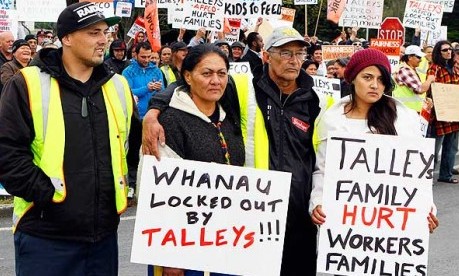How is it that a family-owned company, Talley’s Group, making money from the sea and the land, is able to inflict economic uncertainty on more than 1300 other families? What does it say about the society that makes that lawful?
Is it the ultimate result of colonisation unresolved, that one family, of European origin, is able to determine the economic future of a workforce that is more than 60 per cent Maori and which, for centuries, derived its living from that same sea and land from which the Talley family now make its wealth?
These are tough questions that we will need to answer if we are not to let more than 1300 workers and 5000 children go to the wall as their employer Affco, owned by Talley’s Group, seeks changes to a collective agreement.
In the meatworks, a large part of a worker’s daily pay depends on their team meeting daily tally kill rates, which, in turn, is reliant on the number of people in their team.
Affco wants to have the ultimate ability to determine and change either of these elements – the tally kill number and the team numbers – giving it the ability to reduce workers’ earnings by shifting the goalposts.
It won’t agree to an additional mechanism that protects minimum tally earnings. It has locked most of its unionised workforce out for more than 50 days straight to try to secure this change in the agreement.
Talking to one of these workers at the weekend during a protest in Whanganui, I learned how he had worked for Affco for 30 years, next to his buddy who had been there for 40.
They have shared all life’s ups and downs and believe they may never work together again if the company has its way. They see the union as the only thing that keeps their working life decent and ensures their kids can also work in decent conditions.
Many of these families have exhausted all financial means. They have cashed in their KiwiSavers, frozen their mortgages and got credit card holidays. All these arrangements are coming to an end and they are starting to lose their cars, worry about their houses and realise their retirement will be a poor one. Continue reading
Sources
- Helen Kelly in The Dominion Post
- Image: Stuff
